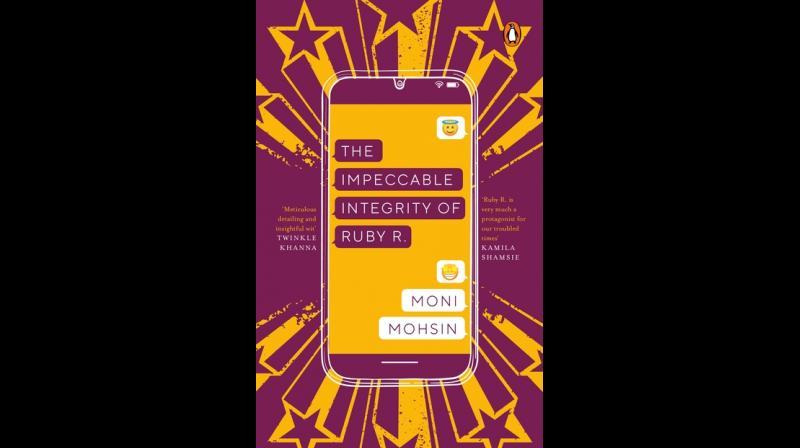The Impeccable Integrity of Ruby R.

Image courtesy Penguin
On a hard-won scholarship to England, Ruby Rauf, 23, is near the end of a master’s in business and media studies when she decides to abandon her degree and return to Lahore. Bowled over by the charisma and promise of Saif Haq, an ageing film star on a mission to transform Pakistan’s politics, Ruby joins his nascent party, Integrity, becoming the manager of its digital operations. The party builds a new momentum on the ground and so, at first, does Ruby in a productive, well-paid working life, but even as the party makes major gains in public support and credibility it is the old forms of apathy and exploitation, power and corruption that overwhelm Ruby’s life. They bring her to breaking point and force a new reckoning.
The following extract is taken from Chapter six of Moni Mohsin’s The Impeccable Integrity of Ruby R.
Ruby was stretched out on her bed, her phone in her hand. Earlier in the day she had put up a new post on Facebook. It was a short write-up accompanied by photos of Saif’s visit to a riverside town ravaged by the untreated effluent of tanneries upstream. The town was a national scandal and a torrent of features, angry letters and news items had appeared over the years in national papers. Environmentalists were up in arms. Despite the local MP’s promises of an urgent clean-up campaign, nothing had changed. There was a photo of Saif sitting under a tree on a string bed, surrounded by villagers squatting on the ground and pouring out their troubles to him.
His robust frame and signature starched white shalwar–kameez were at odds with their limp, dun-coloured clothes and emaciated bodies. But it made him stand out in a good way, Ruby decided, like an angel of mercy. In any case, people liked his starry looks. They wanted him to look rich, strong and capable, a fitting match for his opponents. But she was glad he had not worn his designer shades and his horsebit loafers. There was also another image of him bending low to allow an old toothless woman, hunched almost double, to place a gnarled hand on his handsome head. Eyes closed, Saif was smiling beatifically as if a stream of invisible blessings was flowing from her palm directly into his skull. But Ruby’s favourite was the one of him cradling a disabled baby. He looked at the baby with such tenderness, its tiny head cupped in his palm. Despite herself, she had to admit it made for excellent optics. She mentally patted herself on the back for choosing it over another one in which he was being greeted by a host of smiling children.
Beneath the post was a succession of comments reviling the local MP in language that both delighted and alarmed her. Some of the more extreme ones were downright obnoxious. Further down, a woman had observed that it was as well that Saif Haq was an actor. Posing, whether with nubile starlets or sick children, was all the same to him. Her post had incited an eruption of hate. She was called a dirty bitch, a used-up whore, a fucktard, a piece of shit. One man said he knew where she lived and also where her ‘ripe and juicy’ fourteen-year-old-daughter went to school. ‘Don’t bother to pick her up from school tomorrow. Let me have the pleasure of breaking her in, you stupid cow.’
Ruby looked again at the post and realized that she knew the woman who had objected. It was Mrs Hassun, her history teacher from her old school. A short, rotund woman with a ringing voice and a passion for her subject, she had been Ruby’s favourite teacher at school. An inspired storyteller, she had the rare ability to resurrect long-dead historical characters and bring their conflicts, their challenges thrillingly to life in front of her dazzled class. She was the only teacher at the school who urged her students to think critically. Unlike other teachers who conflated disagreement with insubordination, she encouraged her students to reflect, argue and dissent. Ruby and Farah emerged from Mrs Hassun’s classes feeling as if they had returned from a visit to the optometrist, with a new pair of glasses that brought their fuzzy, blurred world into sharp focus.
But Ruby had a more personal reason for remembering Mrs Hassun with gratitude; she had shown compassion when Ruby’s father had died. Once, when a mortified Ruby had broken down in class over something entirely trivial and unrelated, she had gently led her out on to the veranda and held her close while Ruby wept on her shoulder with huge, shuddering sobs. Afterwards, she had come to their scruffy little house, bearing flowers and fresh fruit, and sat for a long time, conversing in a low voice with Bilkees. Although Bilkees had never said it, Ruby suspected it was Mrs Hassun who had encouraged Bilkees to become a private tutor and helped her by offering recommendations to the parents of her own students.
Ruby dropped her phone on the bed and pressed her fingers to her eyes. The misogyny of social media, its vileness and vulgarity were not new to her. She was still not inured to it but had seen enough to be pragmatic about it. But it was difficult to be philosophical about this particular instance. She thought back to her own tweets and posts to examine if she had in any unintended way encouraged this appalling outburst. She might not have encouraged the crudity, but she knew she had let it go unchecked for she had read equally foul rants from Saif’s supporters targeting other female critics.
But her job was not to police other people’s content. It was merely to put out posts that gave news, and opinions too, but always measured and invariably based on fact. She chose what images to put out, which to discard, what news to share, what to omit and she supposed there was some level of curating there, some degree of manipulation, but then who didn’t exert that control? There was nothing wrong in that.
And really, if Mrs Hassun was going to use it, then she must first learn about the dangers of social media. It was all very well to encourage disagreement in the safe confines of a classroom, but people on social media were not docile schoolgirls from respectable homes. Mrs Hassun ought to know that. It was a wild, vicious place, social media, patrolled by zealots, psychos and delinquents who showed zero mercy to the naive. Any comment, no matter how trivial, was immediately seized and brutally punished. If she was keen to be on social media, why couldn’t she be a silent stalker as so many older people were? However bad she might feel for Mrs Hassun, she was not, Ruby comforted herself, to blame for any of the hideous bile that had been poured on her teacher. There was nothing she could do to fix it either. Mrs Hassun was an adult. As such she was answerable for her actions. She had not consulted Ruby before stepping into this snake pit. She was not Ruby’s responsibility. Ruby was blameless. Her conscience was clear.
So why did she feel so unclean? Ruby went to the bathroom and soaped her hands vigorously, rinsed out her mouth and repeatedly splashed her face with cold water.
This is an excerpt from The Impeccable Integrity of Ruby R. written by Moni Mohsin and published by Penguin Books. Republished here with permission from the publisher.
Moni Mohsin was born and raised in Lahore, Pakistan. Married with two children, she divides her time between London and Lahore.
Courtesy: Indian Cultural Forum
Get the latest reports & analysis with people's perspective on Protests, movements & deep analytical videos, discussions of the current affairs in your Telegram app. Subscribe to NewsClick's Telegram channel & get Real-Time updates on stories, as they get published on our website.
























